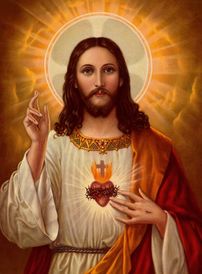
Jesus is the Prince of Peace, as the prophet Isaiah named him. “Peace I leave with you; peace is my farewell gift to you” Jesus said just before his Passion.
In the United States a Basketball star has named himself “Meta World Peace.” I suppose he took that name in hopes of promoting “world peace.” But, like many rich and famous people, and many of the rest of us, he lives his life mostly as if God did not exist. And therefore his dream of “world peace” is simply illusory: there is no real peace outside of God’s will.
Not as the World gives Peace do I give Peace
So Jesus, the Prince of Peace, declares in today’s Gospel that he has come, not to establish peace, but to bring division (“the sword,” in another translation). He means that he has not come to establish “world peace,” the peace of this world, for he says clearly in another place, “in the world you will have no peace.” And again, as he gives his farewell gift of peace, he says “not as the world gives it do I give you peace.”
When we shake each other’s hands in the Mass and say “peace be with you,” we are not to give worldly peace. In fact, the priest specifically says “the peace of Our Lord Jesus Christ be with you all,” not simply “peace be with you.” The ungainly exercise that we see on most Sundays at the “kiss of peace”—people flashing “peace signs” at each other with big grins, chatting noisily in worldly greetings, slapping each other on the back with a loud “peace, Joey!”—this is not what the Holy Spirit has in mind for the sacred liturgy. This kind of glad-handing is less the peace of Christ and more the banal “peace” of this world, more proper to Wal-Mart than the Holy Mass.
Not Peace but the Sword
True peace comes with the growing conviction that God exists and that he loves mankind. Jesus has come to set a fire on the earth, the fire of Divine Love. He burns in anguish to accomplish that baptism of fire, which he will indeed accomplish on the Cross: he will win the peace through a violent death, surrendering to His Father’s will: “It is accomplished.” True peace is accomplished often, in our disordered world, by accepting unavoidable violence with God’s grace. Jeremiah suffers violence in the First Reading because he obeys God rather than men; he speaks the truth that the princes do not want to hear. They throw him into a cistern, and even though he is rescued, Jeremiah will eventually die a martyr’s death for following God. In the second reading, we are told to run the race, to “cast off any encumbrance of sin” that slows us down, to keep our eyes fixed on Jesus, pushing through fire and water if necessary to reach the “perfector of our faith.” True peace, true joy, is running toward Jesus, letting nothing and nobody slow us down.
Know Jesus, Know Peace
Yes, Jesus has come to bring peace, but his peace is often purchased at the cost of division. His peace is a conflagration of love, the violence of God’s passion for man. It is quite different from the “world peace” that so many imagine can be attained apart from God’s law. No government has been able to attain “world peace,” and yet every true Christian, even though besieged by adversity and violence, has Christ’s peace in their hearts and homes. The bumper sticker says it quite concisely: “Know Jesus, Know Peace; No Jesus, No Peace.”


 RSS Feed
RSS Feed